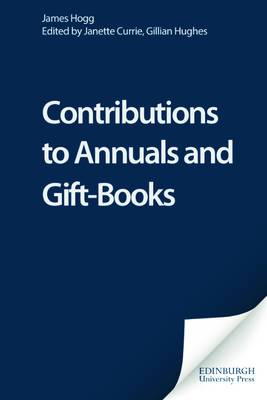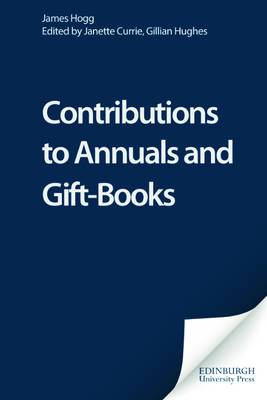
- Retrait gratuit dans votre magasin Club
- 7.000.000 titres dans notre catalogue
- Payer en toute sécurité
- Toujours un magasin près de chez vous
- Retrait gratuit dans votre magasin Club
- 7.000.000 titres dans notre catalogue
- Payer en toute sécurité
- Toujours un magasin près de chez vous
Description
In 1822 Rudolph Ackermann's Forget Me Not [...] for 1823 established a fashion for handsomely produced and copiously illustrated annual anthologies of short literary works. Books of this kind were designed as Christmas and New Year's presents, and in the 1820s and 1830s they became a significant publishing phenomenon. Like other well-known writers of the time (including Wordsworth, Scott, and Letitia Elizabeth Landon), Hogg was a contributor to the annuals, and Contributions to Annuals and Gift-Books brings together all the Hogg texts that were either written for, or first published in, annuals and gift-books. 'Invocation to the Queen of the Fairies' in the Literary Souvenir for 1825 was Hogg's first known contribution to an annual, and thereafter writing for the annuals became 'a kind of business' for him during the economic slump of the late 1820s. Contributions to Annuals and Gift-Books contains some of Hogg's finest short stories (for example 'The Cameronian Preacher's Tale' and 'Scottish Haymakers'), as well as some of his best-known poems (for example 'A Boy's Song' and 'The Sky Lark'). This volume highlights a coherent part of Hogg's total literary output, and in doing so provides new insights into an area of nineteenth-century publishing history that is attracting increasing interest and attention.Hogg was a professional writer with an acute awareness of the shifting trends of the literary marketplace during the 1820s and 1830s, when annuals were at their peak of popularity. However, his literary objectives did not always match the needs of the annuals, and as a result some of his contributions were returned as unsuitable for a family-oriented audience. Hogg's sometimes complex negotiations with the editors and publishers of the annuals are meticulously documented in Contributions to Annuals and Gift-Books. In this context, the volume (for example) reprints both Hogg's manuscript version of 'What is Sin?', and the version actually published in Ackermann'
Spécifications
Parties prenantes
- Auteur(s) :
- Editeur:
Contenu
- Nombre de pages :
- 480
- Langue:
- Anglais
- Collection :
Caractéristiques
- EAN:
- 9780748615278
- Date de parution :
- 27-04-06
- Format:
- Livre relié
- Format numérique:
- Genaaid
- Dimensions :
- 163 mm x 231 mm
- Poids :
- 839 g







